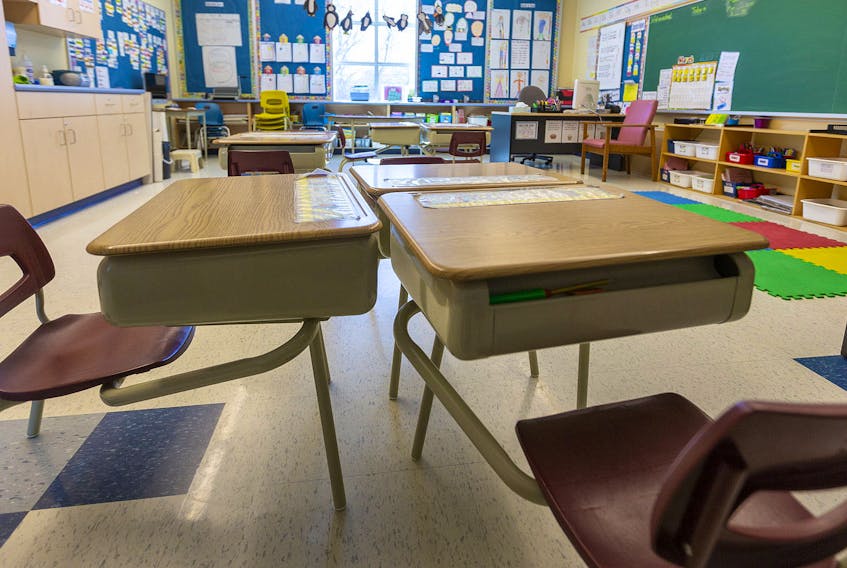Parents are worried and getting more worried every day as they wait for a detailed back-to-school plan to be released by the province’s main school board.
The English School District of Newfoundland and Labrador has announced the plan will be made public on Monday after some last-minute consultations with the Department of Health this week.
For some, however, even that may not be enough.

“We have floated the idea of doing home-schooling,” said Andrea Newbury of Paradise, who has four children, three of whom are school-aged. “I’m in the position right now to stay at home with them. So, depending on what the plan is that we’re given next week, that’s going to be a big decision for us in the next couple of weeks.”
Newbury says her main concern is her daughter who’s going into Grade 7.
“She’s worried about will she have to wear a mask, is she going to be around her friends during the school day, and how that’s going to work,” she said.
“She’s at that age now going into junior high where friends are everything.”
If access to friends is going to be limited, that may be another disincentive.
“If we find the plan they put in place is one that’s not going to benefit them, taking into account their mental health and their emotions … (home schooling) is something to consider for us, definitely,” she said.
Newbury is not alone.
The organizers of a private Facebook group called Homeschoolers of Newfoundland and Labrador say that what started out as a slow trickle when the province shut down schools in March has turned into about 20 inquiries a day in recent weeks.
“As the summer’s progressed, and there’s more and more questions about the school year in September and what’s happening … we’ve had an explosion of interest,” said Sarah Barnes of Botwood, who co-manages the page.
When it started a year ago, there about 50 members, she said. Now there are more than 400.
Keeping calm
Managing the anxiety of children has been a major concern for parents throughout the pandemic, and that’s only augmented by the uncertainty of a new school year.
Newbury has two children going into kindergarten and Grade 2.
“We’ve kept them in the loop, kind of. They know that there’s a virus and they know it’s going to affect things. But we’re trying to shield them as much as we can from any kind of fears.”

For parents who will be sending their children off to school in September, St. John’s psychologist Dr. Janine Hubbard offers some tips to prepare young people for changes, and how to talk to them about those changes.
“I think the uncertainty has really ramped up a lot of the worries, and I think people hopefully will be reassured once they receive a more detailed plan because once we have details then parents know what to expect, but we can also then train kids to know what to expect,” Hubbard said.
She said it’s important to talk to children about the fact that things might look different at school this year, and that’s OK. She said it’s a good opportunity to talk about being flexible in situations that might be unpredictable.
“And reminding them that whatever decisions are being made that both you as parents, and the government, are working really hard to keep them safe.”
Hubbard said it’s important to ask children what they’re feeling. While parents might be worried about COVID-19, children might be preoccupied with other concerns entirely.
“In the past, it’s been very little things, like, ‘What if I don’t know how to find the washroom?’ or, ‘What if I can’t do the lock on my locker?’ And as adults those sound like really minimal things, but for kids, they’re huge worries.
“So, ask — don’t assume. And validate and help model for them how you cope with your fears, how you cope with the unknown, and walk them through. Problem-solve with them in terms of some of those worries and fears.”
Practice makes perfect
Getting back to a proper sleep schedule for the school year will be a big challenge, Hubbard said.
“Sleep routines have really gone out the window, especially for the teenagers who maybe haven’t been able to get the summer jobs that they would have had in the past.”
Hubbard recommends gradually adjusting a few weeks before school starts by changing the time they wake up in the morning by 15 minutes earlier every two to three days.
“Addressing that now, even in baby steps, will be really helpful.”
Hubbard said it’s also a good idea for families to practice wearing masks now, just in case.
“If you are not a family that’s used to wearing masks, now is the time to start building that up as a skill because, yes, at first they feel very uncomfortable, they feel awkward, they feel kind of weird, but you can build up a tolerance to them by building endurance — kind of like that 15 minutes with the sleep.”
Hubbard suggests letting children pick out masks that feel comfortable for them and letting them choose fun designs. She said a good way to start wearing masks is to put them on for a few minutes at a time when children will be focused on an engaging activity, such as playing video games.
Lastly, she said it’s important to model acceptance and empathy when it comes to other families’ situations, or someone testing positive for the virus. Speaking with children ahead of time about the importance of empathy if a classmate tests positive will help to diminish potential stigma.
— with files from Juanita Mercer
Monday: Home-schoolers weigh in









